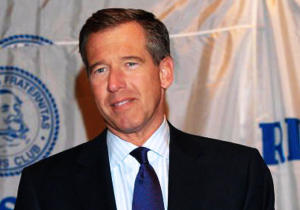 Brian Williams’ well-documented lightning-speed fall from grace has been shocking to witness.
Brian Williams’ well-documented lightning-speed fall from grace has been shocking to witness.
Since the news that he substantially exaggerated his experience in the Iraq war broke, Americans’ perception of his trustworthiness has plummeted. According to a survey conducted by The Marketing Arm, Williams has dropped from “the 23rd-most-trusted person in the country” to number 835. Apparently that moves him from Denzel Washington and Warren Buffet territory down to the level of Duck Dynasty’s Willie Robertson.
As most everyone with a pulse knows, Williams apologized last week. He said he conflated the memory of his experience on a military helicopter in 2003 with what happened to another Chinook ahead of his that was downed by an RPG.
Though he fessed up, his apology has generally not been well-received. Critics say his account is too muddled and not believable. And, as David Carr pointed out, the announcement he made this weekend saying he has decided to take himself off his broadcast for several days left the impression that he is accountable only to himself, which did not sit well with the public.
Another strategic error, it seems.
Now he’s under investigation by NBC and his job is at stake. An announcement distributed this evening by NBC News president Deborah Turness says that the evening news anchor will be suspended for the next six months without pay in the wake of the scandal.
The fall is particularly remarkable because Williams has occupied such a unique place in the pantheon of national broadcast news reporters. He has shifted fluidly between playing the role of a serious newsman and being an entertaining celebrity who lights up the late night circuit with his tales. Several years ago, I interviewed Williams for The New York Post (I take freelance writing assignments from time to time) and I tried to capture the remarkable ability he has to straddle these two worlds deftly. It seems perhaps the roles that were complementary for so long suddenly came into conflict.
Many questions remain. Brian Stetler interviewed a pilot who claimed he was flying the helicopter Williams was on and who said that they were hit by small arms fire. His account lent some credence to the idea that they were in fact hit by something, making it more plausible Williams could’ve conflated being under attack with being downed by an RPG. That pilot, however, has since backed off his story, citing his own memory failures.
It’s hard to know what to make of it. If it was a conscious lie, is there a chance of recovery, or is everything he does now tainted by the possibility that he could lie again? What about the past? Did he embellish his Katrina experience? Are other credibility issues going to surface? On the other hand, if this is an isolated incident is it plausible that Williams did indeed misremember?
Although it’s human nature to believe that our memories are recorders, experts say there’s a chance that the newscaster was the victim of “false memory”, as bizarre as it seems. I was particularly interested to hear Carr’s take on it since he wrote a riveting memoir that was in part about the fallibility of memory. He notes, “Mr. Williams initially reported the story fundamentally as it happened…” but over time in the re-telling it evolved into “something that happened to him.” Carr rightly acknowledges the breach is particularly problematic since it involves the military and “its perils are seen as sacred.” It also disrespects the ultimate sacrifice some of his colleagues have made while reporting from war zones.
We know that credibility is critical – particularly for someone who is ostensibly reporting the facts to his audience – and Williams has made strategic missteps in his attempts at recovery, but does this really need to be the final sign-off for the news anchor? It sounds like we’ll find out soon enough: Given what’s at stake for NBC, the investigator they assigned to the task is under pressure to get a report out ASAP.
What do you think?
